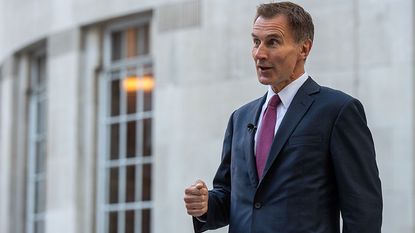Hunt tears up Kwasi Kwarteng’s mini-Budget
The new chancellor, Jeremy Hunt, has torn up Liz Truss’s flagship mini-Budget policies. Here’s everything you need to know.


Only a few days after Jeremy Hunt was appointed by Liz Truss to replace her former chancellor Kwasi Kwarteng, he has torn up the new prime minister’s flagship mini-Budget.
Hunt has decided quickly to calm financial markets to try and bring some stability to a government that has been crippled by a crisis of its own making.
The mini-Budget is no more
The UK’s new chancellor had little choice but to repeal most of the measures rolled out in the Truss-Kwarteng Budget. The unfunded tax cuts unveiled caused turmoil in the financial markets, destabilising the economy and wreaking havoc on the housing market.
Subscribe to MoneyWeek
Subscribe to MoneyWeek today and get your first six magazine issues absolutely FREE

Sign up to Money Morning
Don't miss the latest investment and personal finances news, market analysis, plus money-saving tips with our free twice-daily newsletter
Don't miss the latest investment and personal finances news, market analysis, plus money-saving tips with our free twice-daily newsletter
The Budget that was supposed to ignite the country’s growth engine has done just the opposite.
Even though two of the key pillars of the plan, the corporation tax cut and the scrapping of the 45p in the £1 additional tax rate had already been cancelled by the prime minister and her former chancellor, it was clear more had to be done.
Hunt has now scrapped virtually all of the measures in the mini-Budget apart from those too far down the line to be cancelled.
He is keeping the stamp duty band adjustments from the mini-Budget and the changes to the national insurance uplift (the health and social care levy). And he is also keeping the government’s Energy Price Guarantee, but only until April.
However, the income tax cut that was planned to take effect in April next year is now being postponed “indefinitely.” Truss had planned to cut the basic rate of income tax by a penny to 19p (Sunak had planned to bring in this change a year later in 2024).
The 1.25% cut to dividend tax is also being reversed as well as the changes to IR35 legislation. The plan to introduce a new VAT-free shopping scheme for non-UK visitors to Great Britain is also being cancelled and alcohol duties will go up next year as planned before Kwarteng’s mini-budget.
According to the Treasury’s projections, these changes will raise an additional £32bn in tax revenue, but there could be more changes to come. The Institute for Fiscal Studies (IFS), an economics think tank, believes there are “no easy options” for the government to raise money and Hunt will have to make some “scary decisions” to balance the books.
The turbulence of the past few weeks has made the situation a lot worse for policymakers.
According to economists, the government’s debt interest bill could jump to £100bn next year, thanks to inflation and higher borrowing costs. That’s twice as much as forecasts were projecting last year.
We will have to wait and see how Hunt plans to deal with these challenges when he unveils his full Budget (along with OBR forecasts this time) at the end of the month.
To help meet these challenges, the government has created a new Economic Advisory Council. This group of “leading and respected experts” will meet regularly to discuss the UK’s economic position and sentiment in the financial markets.
This seems to be another pillar of Hunt’s plan to restore market confidence in the UK. The initial list of council members includes representatives from BlackRock and J.P. Morgan, two of the largest and most influential financial institutions in the world.
What does the reversal of the Kwasi Kwarteng mini-Budget mean for you?
While the markets do seem like the mini-budget U-turns, a lot of damage has already been done to the UK economy and the country’s fiscal credibility.
Mortgage rates have jumped as lenders usually hedge their mortgage book using derivatives called swaps, the price of which is linked to gilt yields.
At one point, the UK 30-year gilt yield was trading at more than 5%, and this fed through into mortgage prices. The average two-year interest rate now stands at more than 6%.
Bond prices have come back. At the time of writing the 30-year gilt is trading with a yield of 4.4%. However, this does not mean mortgage providers will begin to cut rates. Uncertainty is the name of the game right now and mortgage providers may continue to place an uncertainty premium on rates.
One piece of good news is that the pound has recovered a good deal of its losses against other currencies over the past week.
A stronger pound not only makes foreign holidays cheaper, but also reduces the cost of imports, and, as a result, inflation. That could make life easier for consumers and reduce the need for the Bank of England to act aggressively in hiking interest rates further (increasing the cost of everything from mortgages to credit cards and business loans).
Nic studied for a BA in journalism at Cardiff University, and has an MA in magazine journalism from City University. She joined MoneyWeek in 2019.
-
-
 Investment trust discounts hit 2008 levels. Here’s how to profit
Investment trust discounts hit 2008 levels. Here’s how to profitInvestment trust discounts have risen to levels not seen since 2008, here are three trusts looking to buy to profit.
By Rupert Hargreaves Published
-
 A luxury stock to buy at a high street price
A luxury stock to buy at a high street priceInvestors wrongly consider Watches of Switzerland a high-street outlet.
By Dr Matthew Partridge Published
-
 UK wage growth hits a record high
UK wage growth hits a record highStubborn inflation fuels wage growth, hitting a 20-year record high. But unemployment jumps
By Vaishali Varu Published
-
 UK inflation remains at 8.7% ‒ what it means for your money
UK inflation remains at 8.7% ‒ what it means for your moneyInflation was unmoved at 8.7% in the 12 months to May. What does this ‘sticky’ rate of inflation mean for your money?
By John Fitzsimons Published
-
 VICE bankruptcy: how did it happen?
VICE bankruptcy: how did it happen?Was the VICE bankruptcy inevitable? We look into how the once multibillion-dollar came crashing down.
By Jane Lewis Published
-
 Would a food price cap actually work?
Would a food price cap actually work?Analysis The government is discussing plans to cap the prices of essentials. But could this intervention do more harm than good?
By Nicole García Mérida Published
-
 What is Warren Buffett’s net wealth?
What is Warren Buffett’s net wealth?Features Warren Buffett is one of the world’s richest people. But how did he make his money?
By Jacob Wolinsky Last updated
-
 What is Rihanna's net worth?
What is Rihanna's net worth?Features Rihanna became the youngest self-made billionaire in 2022. Here’s how she made her money.
By Jacob Wolinsky Published
-
 UK inflation slides to 8.7% - what does it mean for your money?
UK inflation slides to 8.7% - what does it mean for your money?News Inflation has dropped below 10% for the first time in months, but with food prices at a 45-year high, is this good news and what does it mean for your money?
By Tom Higgins Published
-
 What is Bill Gates's net worth?
What is Bill Gates's net worth?Features Bill Gates is one of the world’s richest people, but how did he make his money?
By Jacob Wolinsky Last updated









